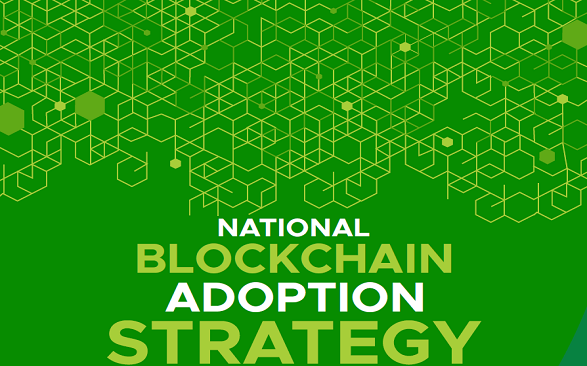The Federal Government of Nigeria approved the National Blockchain Adoption Strategy, otherwise known as the national blockchain policy. The draft of the national blockchain policy was first introduced by the National Information Technology Development Agency (NITDA) in 2020. Having reviewed the draft, the Federal Executive Council approved the policy for Nigeria during its meeting Wednesday 3 May 2023.
According to the Honorable Minister of Communications and Digital Economy, Professor Isa Ali Ibrahim (Pantami) who presented the memo, “we can safely say that blockchain technology with all its components and types have been institutionalised in the country”.
In a tweet issued by Femi Adeluyi Senior Technical Assistant (Research & Development) to the Honorable Minister of Communications and Digital Economy, it was stated that “[t]he vision of the Policy is to create a Blockchain-powered economy that supports secure transactions, data sharing, and value exchange between people, businesses, and Government, thereby enhancing innovation, trust, growth and prosperity for all,” the statement said.
Has the Nigerian Government now legalized crypto?
Many are asking questions. Has the government now legalized crypto in Nigeria? Does it mean all blockchain use cases are now accepted in the country? How about the cryptocurrency directive of February 2021 by the Central Bank of Nigeria (CBN)?
First, the National Blockchain Adoption Strategy is a policy document, not a legal document. So it does not have any legal effect. It only documents the federal government’s idea of blockchain technology and how it plans to leverage it to support Nigeria’s transition into a digital economy.
Second, the drafters of the National Blockchain Adoption Strategy, tactically avoided including crypto, whether as cryptocurrencies or cryptoassets, in the policy document. Besides, the policy document is incapable of legalizing anything, including crypto. Essentially, the policy is a strategy paper or plan.
Third, the National Blockchain Adoption Strategy is (mainly) focused on the public sector, not the private sector. Its mission is “to drive the adoption of blockchain technology in government in a way that supports efficiency, transparency, and productivity”. So the goal is to see ministries, departments, and agencies of the government apply blockchain to support e-governance in all sectors.
Implementation of the national blockchain policy by relevant agencies and stakeholders.
On how the Policy would be implemented, the statement reads that “[t]he Federal Executive Council has further directed relevant regulatory bodies to develop regulatory instruments for the deployment of Blockchain Technology across various sectors of the economy. These regulatory agencies include NITDA, the Central Bank of Nigeria (CBN), the National Universities Commission (NUC), the Securities and Exchange Commission (SEC) and the Nigerian Communications Commission (NCC), among others.”
Also, NITDA, under the supervision of the Federal Ministry of Communications and Digital Economy, is required to coordinate the activities of the Policy.
Further, a multi-sectoral Steering Committee has also been approved to oversee the implementation of the Policy.
Major challenge to national blockchain policy implementation. Where the CBN stands.
One of the major challenges to the successful implementation of the Policy is the lack of legislative backing. Notably, there is no legislative framework that obligates any of these regulatory agencies to develop regulatory instruments to deploy blockchain technology across various sectors of the Nigerian economy.
Similarly, NITDA’s powers under the National Information Technology Development Agency Act 2007, is grossly limited as far as the authority to coordinate—or even more so direct—relevant agencies to implement the Policy is concerned. This is the same with the Ministry of Communications and Digital Economy.
From a CBN angle for instance, there are two major dimensions to Policy implementation. One is positive and the other negative. Positively, the CBN can be rightly said to have already started implementing a blockchain strategy in the banking and financial system in Nigeria through its introduction of eNaira, a central bank digital currency that leverages blockchain technology to improve—or at least expand—payments. Negatively, the CBN’s current anti-cryptocurrency stance will ensure that use cases of blockchain technology that involves crypto—particularly decentralized cryptocurrencies such as bitcoin, Ethereum, Litecoin, etc. do not thrive. In fact, these decentralized currencies could be seen as unhealthy competitions to the eNaira.
Looking Forward
Hopefully, the Policy is updated from time to time. Noticeably, the current version reads like it is still 2018 or 2019, except for the unfortunate reference to CBN’s cryptocurrency circular of 5 February 2021 which has given undue recognition to the illegal circular. Since October 2021, the CBN cryptocurrency circular has been described as illegal by the Federal High Court (Abuja Division) in Governor CBN v Rise Vest Technologies Ltd & Others [suit no. FHC/ABJ/CS/822/2021]. The circular is null and void under Nigerian law. Obviously, the illegal CBN circular has impacted on the scope of the national blockchain policy. Crypto is the elephant in the room.
Noticeably, however, a new version of the national blockchain policy, titled National Blockchain Policy for Nigeria became available on NITDA website after the federal government inaugurated the National Blockchain Implementation & Steering Committee, Wednesday 18 May 2023, Abuja FCT. This version ought to have been circulated much earlier. Pending my written opinion on the latest version of the national blockchain policy, it is already refreshing to notice that the part of the policy that referred to and effectively recognized CBN’s illegal circular on cryptocurrency has been removed, and rightly so. A national policy should never promote or associate itself with illegality, otherwise that policy—or at least the affected part of the policy—is also effectively illegal and invalid.
Notwithstanding, the National Blockchain Adoption Strategy—as the first official document on blockchain technology by the federal government—is a welcome development. It is neither a law nor a regulatory framework. But it is important for Nigeria’s vision, mission, goals, and strategies on an emerging technology with such potentials as blockchain to be documented.
Nigeria’s blockchain policy presents a great opportunity for stakeholders to (re)build synergy. It is not—and cannot possibly be—the complete answer to the adoption and regulatory challenges Nigeria presently faces, especially in the financial sector. Stakeholders must continue to engage.
Updated 19 May 2023 following the availability of a new version of the national blockchain policy titled National Blockchain Policy for Nigeria on NITDA website after the federal government inaugurated the National Blockchain Implementation & Steering Committee , Wednesday 18 May 2023, Abuja FCT.
by Senator Ihenyen, Editor-in-Chief, CAB. Senator is the Lead Partner at Infusion Lawyers where he heads the Blockchain & Virtual Asset Practice. He is the immediate former President of SiBAN, former General Secretary of Blockchain Industry Coordinating Committee of Nigeria (BICCoN), and former General Secretary of Fintech Alliance Coordinating Team (FACT).
Discover more from Crypto Asset Buyer
Subscribe to get the latest posts sent to your email.




